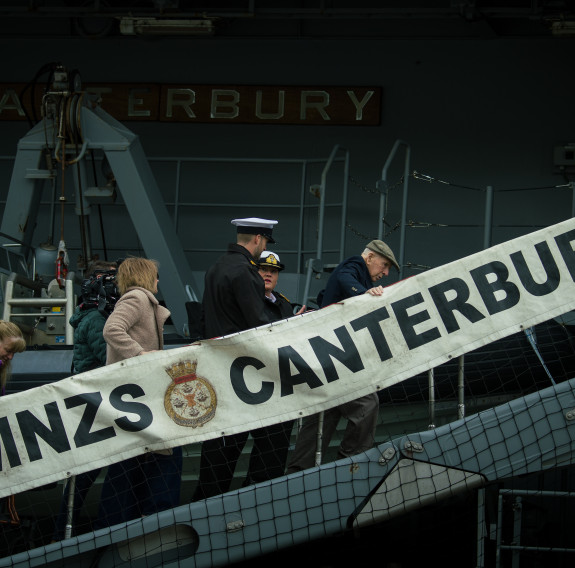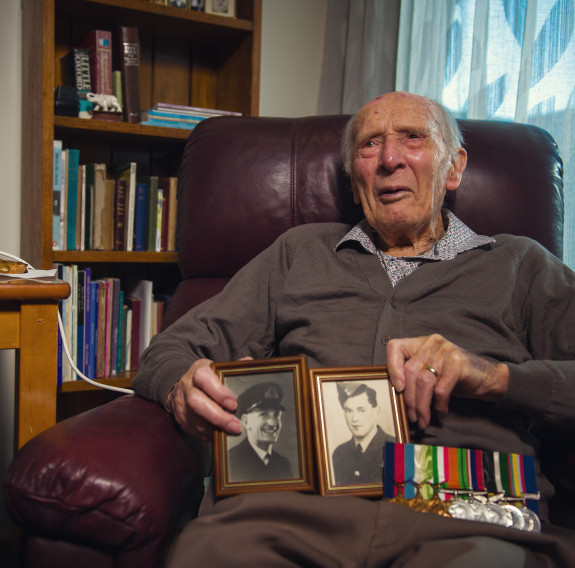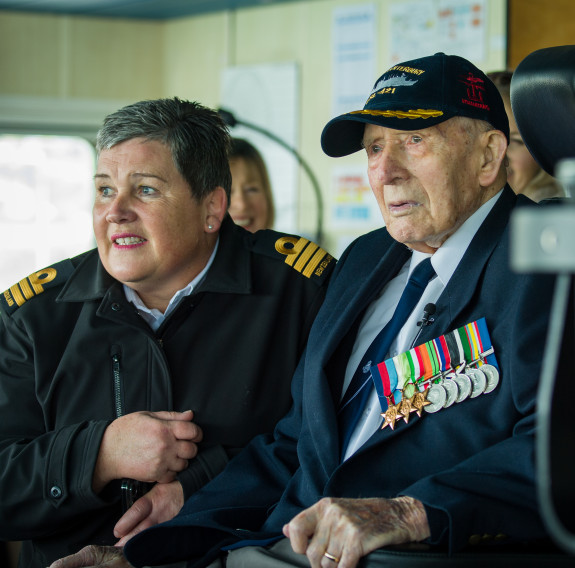Anzac Day 2024
22 April 2024
Unfortunately you are viewing this website on an outdated browser which does not support the necessary features for us to provide an adequate experience. Please switch to a modern browser such as latest version of Google Chrome, Mozilla Firefox, Apple Safari or Microsoft Edge.
Ngā mihi nui
At 104 years old, World War Two Naval Officer Lieutenant (retired) Keith Williamson, says his time at war was a part of his life unlike anything else he experienced.
LT Williamson was a guest of honour aboard HMNZS Canterbury this month, during the ship’s visit to Lyttelton. It was a good choice for a visit, with Canterbury carrying the modern, smaller equivalent of the Infantry Landing Craft he was involved in at the latter stages of the war.
He was studying to become a teacher at Otago University as the war broke out. By 1941, the 21 year old was thousands of miles away from home, awe-inspired at the completely different world he found himself in.
Eighty years on, he still reflects on the memories he made and the friends that were lost.
After completing initial seaman’s training in Suffolk his first posting, was to HMS Stork, commanded by famed U-boat hunter, Captain Fredrick ‘Johnnie’ Walker.
He would quickly come to find that no amount of training would prepare him for the real battle.
Escorting merchant ships between Liverpool and Gibraltar, the Stork would often be found at the front of a convoy of up to 50 vessels, waiting for a sign from ASDIC crew in the bowels of the ship that they were in danger.
“When the alarms bells started ringing and everyone sprung up, your initial reaction, well quite plainly it was fear.”
“I remember a Captain once said to me, “don’t be afraid of being afraid” and that stuck with me. It’s normal to be scared and it would have been ridiculous to claim that you weren’t. As the battle proceeded, those feelings subsided because you had a job to do.”
“To start with, my job was ammunition rating, in other words, passing a shell onto the next bloke.”
However, Lieutenant Williamson described the moments in between the battles as almost peaceful, sailing through seas with Vera Lynne songs playing over the loud speakers.
“I remember when it came to the mess, they favoured me, ‘Kiwi first’ sort of thing. They were very good in that way.”
“We had no trouble sleeping to, you were that tired that from the moment you got into your hammock, you were asleep in no time.”

Lieutenant (retired) Keith Williamson boards HMNZS Canterbury during the ship’s recent visit to Lyttelton.

Keith Williamson holds photos of two close friends, Ray Graham and Stuart Read, who died during World War 2.

Commanding Officer of HMNZS Canterbury, Commander Bronwyn Heslop and Keith Williamson on board HMNZS Canterbury.
Even so far away from home, his down to earth New Zealand nature was always apparent.
“When things were quiet, it was my job to take Captain Walker his early morning cup of tea and I would say good morning sir, and some remark about the weather, he was a really nice man to deal with,” he said.
“When we got a new Captain, I was told that I was too familiar for an ordinary seaman. I should just say Captain, sir.”
Lieutenant Williamson then commissioned as an officer and travelled to America where would be part of the Combined Operations, working on Landing Craft Infantry – Large (LCI-L) ships with the army to deliver troops to theatre.
Sailing around the North Atlantic Ocean and Mediterranean Sea, the weight of his new title was heavy on his shoulders. Keith was no longer delivering cups of tea but responsible for up to 200 soldiers.
“The tensest moments were just before putting troops ashore. You were waiting in the dark, low on sleep and you start to wonder, what’s going to happen next.”
“After our first landing there was some surprise, I remember saying to myself, I’m still alive.”
Eventually, his ship was laid up and in-between postings, Keith was granted three months home leave, arriving back in Dunedin just before VE Day.
“One moment you’re a naval officer and the next minute your back in the classroom, you just accepted it.”
“I used to think, was it even really me?”